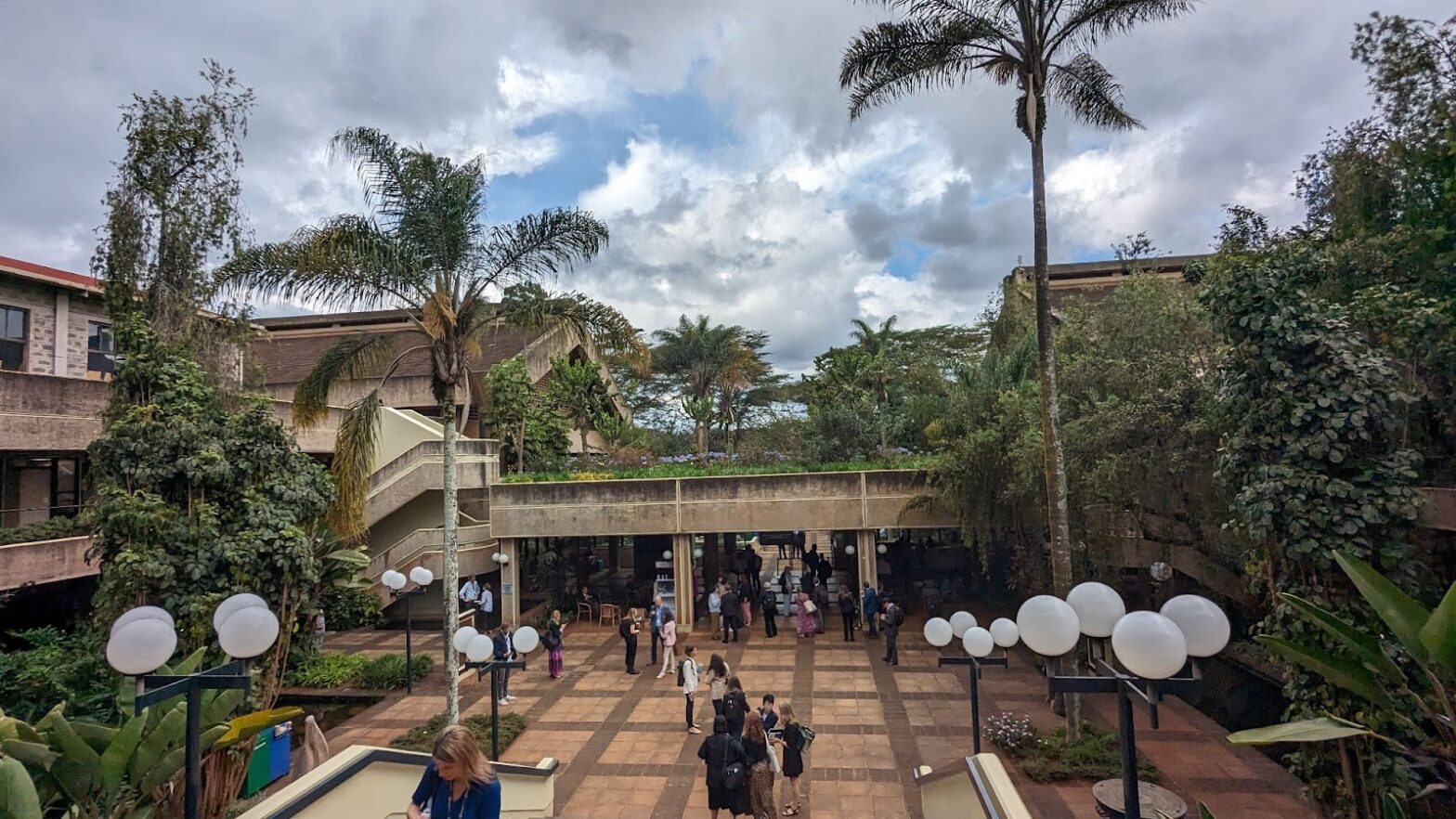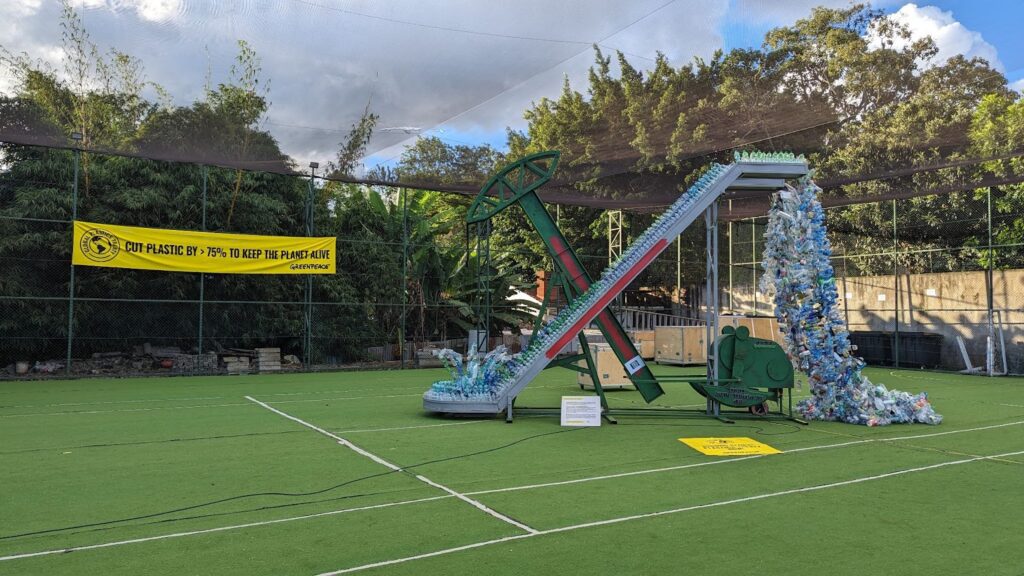Significant work still to be done, but the ‘Nairobi Spirit’ brings progress

Delegates gather in the UNEP compound. Photo by Sam Winton.
The INC-3 UN Plastics Treaty negotiations in Nairobi are reaching a critical point, with majority consensus on many key issues and opposition from small but implacable groups of delegates remaining. Sam Winton provides an insider’s view of the current state of progress.
Day 4 of INC-3 resumed at 10am with Contact Groups 1 and 3 meeting. I chose to attend Contact Group 1 where no less than 9 Provisions and Sub-provisions of the Zero Draft were on the agenda for discussion. A mammoth task for the Co-Facilitators to manage. Throughout the morning many interventions called for specific text revisions which were submitted in writing. These reflections will focus on the verbal comments from Members.
Provision 7 (Extended Producer Responsibility)
The morning commenced with a detailed discussion on Provision 7 (Extended Producer Responsibility). Members were presented with 2 options for consideration with Option 1 mandating each nation to establish EPR schemes according to modalities set out by an annex, and Option 2 encouraging members to establish EPR without suggesting any modality. There was no consensus over which Option to support and multiple members suggested significant revisions to the existing text, including merging of paragraphs in Options 1&2. However, a few common themes in the debate include:
- Any EPR scheme’s mandate should include measures to increase Reuse and Refill options to move solutions up the waste hierarchy.
- Recognition that any EPR policy must be flexible to the needs of various members including SIDS.
- Regardless of whether EPR is mandated there will need to be harmonised guidance to ensure schemes are interoperable.
- The implementation of a phased sectoral approach allowing members to start and expand their scheme.
- Any EPR scheme must facilitate a just transition including recognising the rights of waste pickers.
Two key challenges were noted. Firstly, that Parties should not be forced to adapt existing EPR schemes which currently operate well, and second that EPR may not be appropriate in SIDS and other vulnerable nations.
Provisions 8 (Emissions and releases of plastic throughout its life cycle) and 9 (Waste Management)
Provisions 8 (Emissions and releases of plastic throughout its life cycle) and 9 (Waste Management) were broadly discussed on the same terms. Provision 8 requires Members to ‘prevent and eliminate the emissions and releases of plastic polymers, plastics, including microplastics, and plastic products’ and ‘prevent and eliminate emissions and releases of plastic pellets, flakes and powder’, subject to certain exemptions. There was general support for this Provision though members sought adjustments. These included; an annex to specify the sources of emissions to be regulated. Replacing the term ‘emissions’ with ‘leakage’ to avoid confusion with carbon emissions. Specification of a sectoral approach to control measures. There were also interventions raising challenges, including that the Provision could be difficult to apply for microplastics.
Provision 9.a on Waste Management has 2 options, with Option 1 setting minimum requirements for environmentally sound waste management, and Option 2 allowing the use of nationally determined targets. While there was no consensus for either option, there was significantly more support for Option 1 as a starting point. Despite broad support for the importance of its measures, Provision 9.b on Fishing gear received significant debate on where the text should sit. There was no consensus with different members wanting it to be moved to Provision 8, left in its current place, or moved to a new dedicated provision. Supporters of the Provision sought significant measures to strengthen the text including regulation through EPR, ensuring the full life cycle of fishing gear is included, the inclusion of aquaculture gear, and reference to a just transition. One member particularly referenced just transition with regard to small scale fishers who this Provision may disproportionately affect. There was support for intersessional work to facilitate a significant rewrite and/or repositioning of this text.
Provision 10 (Trade in listed chemicals, polymers and products, and in plastic waste)
The final Provision covered in full was Provision 10 (Trade in listed chemicals, polymers and products, and in plastic waste). This Provision has 2 parts, both of which have significant challenges despite some support. Provision 10.a regarding trade in listed chemicals, polymers, and products, was greatly opposed by a small but vocal constituency of Members. This was particularly due to a perceived restriction of the right to trade, in contravention to Rio Principle 12. Additionally Members felt that the text as written may contravene WTO laws. Members speaking in support of the provision stated that parties to the Treaty should apply this Provision when trading with non parties. Provision 10.b concerning transboundary movement of waste received broad opposition on the basis that it duplicates the measures of the Basel Convention and is therefore unnecessary. Concern was also raised about impact on SIDS of the text in its current form as they lack the infrastructure to recycle plastic domestically.
Despite the best efforts of the Co-Facilitators and a remarkably concise set of statements from Members, at this point the session had run 1.5 hours over its scheduled 3 hour slot. In order to ensure Members had the opportunity to have a very late lunch before the stocktaking plenary, only 30 minutes remained in which to conduct the first reading of Provisions 11 (Existing plastic pollution, including in the marine environment), 12 (Just transition), and 13 (Transparency, tracking, monitoring and labelling). Therefore, I am unable to draw conclusions of consensus or divergence from the limited interventions received. However, I will briefly summarise the main points heard. On existing plastic, members felt that parties should identify, assess and prioritise key accumulation zones, cooperate with indigenous people and determine common methods for sharing data. On Just transition, Members felt that Indigenous people, people with disabilities and informal workers including waste pickers should be explicitly referenced. On transparency, tracking, monitoring and labelling, members favoured a start and strengthen approach, linking to the WTO and with harmonised information flows. These conversations will continue in subsequent Contact Group sessions.

Stocktaking plenary
At 4pm the stocktaking plenary was formed. Co-Facilitators of all 3 Contact groups provided brief overviews of their work conducted during the first reading. Contact Group 1 has convened on 4 occasions, conducting a first reading of the suggested measures in the Zero Draft. 182 suggested text revisions have been submitted. Suggested topics to be discussed in intersessional work include common and global targets for primary plastic polymers, design standards for circularity, and criteria for chemicals of concern and problematic plastics. Contact Group 2 has convened 3 times to conduct a first reading of the implementation measures in the Zero Draft. Many suggested revisions to the text have been received. Suggested topics for intersessional work include Financing, Capacity building and development of guidance around national plans.
Contact Group 3 has convened on 3 occasions to consider the synthesis report on matters not discussed at the committee’s second session. On preamble, there is convergence around a short, concise text which builds on Resolution UNEP/EA.5/Res.14. This should be finalised late in the process. On definitions, there is convergence on the use of existing definitions with flexibility to adapt to the Treaties context. These should be finalised late in the process. On Principles, there is convergence on certain principles including the Rio Principles. How to incorporate them into the text needs further debate. On Scope, there is convergence on using Resolution UNEP/EA.5/Res.14 as a basis for a full life cycle approach. There is divergence on the boundaries of the full life cycle. On Institutional Arrangements, there is convergence on the establishment of a Conference of Parties, one or more subsidiary bodies, and a secretariat to assist the COP. On final provisions, there is convergence on basing text on existing MEAs with Document UNEP/PP/INC.1/8 considered a good basis.
In summary, Chair of the INC Ambassador Meza-Cuadra stated over 300 suggested text revisions had been received by the secretariat. This will be incorporated into revised Zero Draft text with individual Provisions released to Contact Groups as soon as they are ready, for a second reading. Contact Groups will conclude their work by Noon on Saturday. Plenaries after this point will focus on procedural matters, and securing a mandate for intersessional work and a first draft of the Treaty to be presented prior to INC-4. Ambassador Meza-Cuadro and the Co-facilitators praised the flexible and co-operative nature in which negotiations have been conducted to date, known locally as the ‘Nairobi Spirit’ and at this key stocktaking moment, there is reason to be optimistic that by the close of this third session of the Intergovernmental Negotiating Committee we will have seen significant progress.
Author biography

Sam Winton is a postgraduate researcher who has worked in the Revolution Plastics team at the University of Portsmouth since its creation in 2020. Sam recently commenced a PhD ‘Exploring the development and outcomes of the global plastics treaty’ at the University of Portsmouth and the University of Surrey. Sam also works with the University of Portsmouth’s Global Plastics Policy Centre (GPPC) researching stakeholder views of the treaty process to date.
With a background in environmental hazards and community preparedness, Sam’s main research focus is working with communities and a broad range of stakeholders to tackle environmental challenges. He has also conducted work with international organisations with a view to creating policies to tackle the global plastics problem, and facilitate sustainable development.